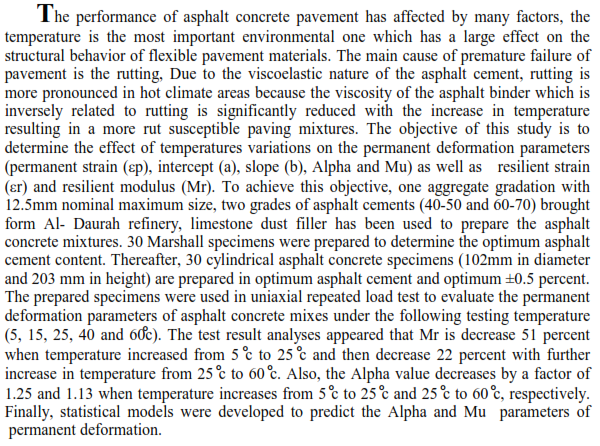


 (22)
(22)
 (12)
(12)
 (120)
(120)
 (101)
(101)
This paper presents the thermophysical properties of zinc oxide nanofluid that have been measured for experimental investigation. The main contribution of this study is to define the heat transfer characteristics of nanofluids. The measuring of these properties was carried out within a range of temperatures from 25 °C to 45 °C, volume fraction from 1 to 2 %, and the average nanoparticle diameter size is 25 nm, and the base fluid is water. The thermophysical properties, including viscosity and thermal conductivity, were measured by using Brookfield rotational Viscometer and Thermal Properties Analyzer, respectively. The result indicates that the thermophysical properties of zinc oxide nanofluid increasing with nanoparticle volume f
... Show More (3)
(3)
 (2)
(2)
Among a variety of approaches introduced in the literature to establish duality theory, Fenchel duality was of great importance in convex analysis and optimization. In this paper we establish some conditions to obtain classical strong Fenchel duality for evenly convex optimization problems defined in infinite dimensional spaces. The objective function of the primal problem is a family of (possible) infinite even convex functions. The strong duality conditions we present are based on the consideration of the epigraphs of the c-conjugate of the dual objective functions and the ε-c-subdifferential of the primal objective functions.
 (1)
(1)
General propositions have dealt with various indicators and features that frame and describe basic architectural concepts, and from those concepts, the concept of identity will be presented here, which represents the nerve of intellectual vision of the state of architecture development, transformation and change. Due to its deep intellectual basis, it was necessary to study multiple features, especially the achievement feature that was considered a major stage describing the nature of change and shift related to the achievement of concept and its role in the development of the architectural field . &nb
... Show MoreThe present calculation covers the building shield during irradiation process and under water storage of three milion curries Cobalt-60 radiation source the calculation results in design requirement of 8m depth of water in the source stoeage pool
A niger, a fungus which doesn't have high ability to production lipid, this fungus has been select to investigate the non oleaginicity. In this search, there are explorations about: i) growth profile ii) enzymes profile iii) isoforms. Growth profile shows that this fungus doesn't have ability to accumulate lipid more than 6% while bio mass are around 10g/l in spite of the presence of glucose in the media till the end of cultivation time and excision of nitrogen within 24 hrs. In enzyme study, we investigate all lipogenic enzymes Malic enzyme (ME), Fatty acid synthase (FAS), ATP: Citrate lays (ACL), NAD+ isocitrate dehydrogenase (NAD+ICDH), Glucose-6-phosphate (G6PD), and 6-phosphogluconate dehydrogenase (6PGD), all these enzymes show, ac
... Show More (1)
(1)
As they are the smallest functional parts of the muscle, motor units (MUs) are considered as the basic building blocks of the neuromuscular system. Monitoring MU recruitment, de-recruitment, and firing rate (by either invasive or surface techniques) leads to the understanding of motor control strategies and of their pathological alterations. EMG signal decomposition is the process of identification and classification of individual motor unit action potentials (MUAPs) in the interference pattern detected with either intramuscular or surface electrodes. Signal processing techniques were used in EMG signal decomposition to understand fundamental and physiological issues. Many techniques have been developed to decompose intramuscularly detec
... Show MoreGivers of foreign Audit about Social Responsibility of Profit Organization. The recent time is charcterstically with big economic Organization activities, because there are many transactions between these Organizations and different financial markets development techniques.
This encourgage business men to increase their efforts for investment in these markets. Because the Accounting is in general terms it represents a language of these Unions Activities and translate them in to fact numbers, for that there is need for Accounting recording for certain of these Organizations behavior and their harmonization with their Objectives.
In this respect the Audit function comes to che
... Show MoreThis paper reports an evaluation of the properties of medium-quality concrete incorporating recycled coarse aggregate (RCA). Concrete specimens were prepared with various percentages of the RCA (25%, 50%, 75%, and 100%). The workability, mechanical properties, and durability in terms of abrasion of cured concrete were examined at different ages. The results reveal insignificant differences between the recycled concrete (RC) and reference concrete in terms of the mechanical and durability-related measurements. Meanwhile, the workability of the RC reduced vastly since the replacement of the RCA reached 75% and 100%. The ultrasound pulse velocity (UPV) results greatly depend on the porosity of concrete and the RC exhibited higher poros
... Show More (30)
(30)
 (30)
(30)